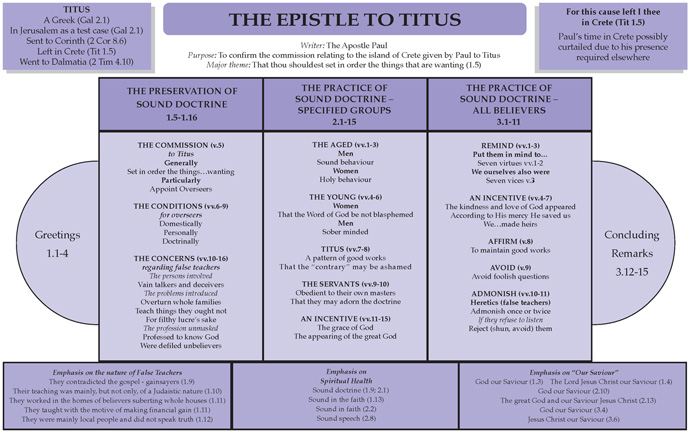
No mention of Titus is made in the Acts of the Apostles and we have, therefore, to turn to the epistles of read of him. He was a Gentile, as Paul confirms in Galatians 2.3: "But neither Titus, who was…a Greek…". His nationality is not known - the use of the term "Greek" indicates that he was not a Jew. In Galatians 3.28 it is seen that Paul used the word "Greek" for all who were not Jews. This mention of him in the Galatian Epistle reveals Paul’s masterstroke - that of bringing an uncircumcised Gentile believer with him when he went to Jerusalem to seek to correct the teaching of Jews that all believers must be circumcised (Acts 15.1). Although it does not state categorically that Paul would not have this carried out on Titus, the comment of Vine in his exposition of Galatians seems accurate: "The Apostle can hardly have intended to assert that Titus was circumcised as evidence that he had not yielded on this very point. Surrender is not proof of victory…he showed his firmness…in refusing to have Titus circumcised".
Titus, whose name means "honourable", was a fellow worker in the gospel with Paul. The trust and confidence that the Apostle had in him is seen in his reference to Titus as "my partner and fellowhelper" (2 Cor 8.23). Together with two other brethren, Titus had travelled to Corinth, partly to encourage the saints there to have a gift ready for the needy believers in Judaea, which Paul would deliver to Jerusalem. Paul waited at Troas for his return from Corinth with news of how the first epistle had been received (2 Cor 2.12-13; 7.6).
This epistle is the next chronological mention that we have of him. He had been with Paul in Crete, a visit that is not recorded in Scripture, and had been left there to complete work that had to be done. Towards the end of his second epistle to Timothy we read that, as he faced execution, Paul sent Titus to Dalmatia (4.10).
Crete
The charge to Titus
The island of Crete lies in the Eastern Mediterranean. The visit to which reference has been made must have been during the time of freedom enjoyed by the Apostle between his first and second imprisonments. The purpose of leaving Titus behind was evidence of the trust that Paul still had in him, and Paul summarised the work to be carried out under two headings. The first was to "set in order that things that are wanting", and the second was to "ordain elders in every city" (1.5). Paul’s desire was that there would be a "healthy" testimony on the island. The use of the word "sound", which means "healthy", together with the fact that "set in order" can mean to "set a broken limb", reveals the mind of the Apostle as he wrote.
The problems faced in Crete
The gospel had resulted in numbers of believers being found in many of the cities on the island. Proof of this is the fact that elders had to be appointed "in every city". Assemblies require government without which conditions can range from an unscriptural "democracy" or a very damaging "dictatorship".
This work of God had been attacked by teachers who were "vain", "deceivers", and who worked for financial gain (1.10-11). Titus was to be forthright in his denunciation of these men. Their mouths were to be "stopped" (1.11), and they were to be rebuked "sharply" (1.13). Urgent effective action was to be the order of the day. Doubtless the saints in Crete knew that he had the support of Paul in carrying out that vital work. Let us always remember that the devil and his servants are interested spectators of the work of a local assembly, and they will attack when they see an effective work being carried out for the Lord. Their methods and mode of attack may vary, but we can be assured that they will work to destroy the testimony. Let us not be lax in maintaining the doctrinal and moral standards that are demanded of us and with which we should happily agree.
The preservation of sound doctrine: Chapter 1
The elders
It must not be thought that it falls to anyone today to "appoint" elders. No such instruction is given in Scripture, but Titus here was acting under the apostolic authority of Paul. The lesson is that every assembly must have recognised authority. There is no place for "brethren’s meetings" where all brethren have equal say in the spiritual matters which affect the saints. But leadership demands Christian character, seen not only in the gatherings of the saints, but also in all others spheres of life. Those who would seek to guide the assembly must, for example, have a home life that is well ordered.
Teaching
Leaders must also be able to teach sound doctrine. This does not mean that they will all be able to occupy the platform, but it does indicate that they must be well taught in the truths of the Word of God, be able to defend those truths and to answer the teachings of those who oppose them. The Scripture expects all Christians to have desires to get to know the Bible and be competent in handling its instruction. God sets no premium on ignorance.
The practice of sound doctrine - specified groups: Chapter 2
Young and old vv.1-6
The apostle now turns to a consideration of groups in fellowship in the assemblies. The aged are addressed and the young are taught. One lesson to learn is that each age group requires teaching. Those who are older are in need as much as those who are young; therefore, there is no time when saints are so mature that they do not have a need to listen to the Word of God. This teaching was not to be giving merely on rare occasions. Wuest translates the opening words of this chapter as, "Be constantly speaking".
Another notable point is seen in v.5 where it is clear that a home life that is not a good testimony for the gospel can result in the Word of God being reviled. The private lives of the saints are as important as their public lives. In ch.1 we saw that the false teachers attacked the home life of the believers.
Titus vv.7-8
Those who teach must be a good example of their own teaching. Titus was to be a "pattern" of good works. He was to behave in a manner that was worthy of being followed. Without that, his teaching would have no moral weight.
Employees vv.9-10
The question of the behaviour of employees, represented by "servants", is also dealt with. They must not "answer again", that is, they must not be known as grumbling servants who argue with and contradict their masters. They must not steal, but be honest workers. It should be noted that stealing does not always refer to goods. To take time off work with no good reason is to steal time which rightfully belongs to the employer. An effective form of evangelism is "to adorn the doctrine of God our Saviour in all things".
The consequences of salvation vv.11-15
The grace of God has appeared to all men, but the teaching is for us - for those who have believed the gospel. That there will be a marked difference in behaviour after salvation is a vital part of the gospel message. The profession of faith in the Lord Jesus is linked with "denying ungodliness", that is, with a decisive turning away from ungodliness.
The practice of sound doctrine - all believers: Chapter 3
Responsibilities in the world vv.1-2
In the main, perhaps with the exception of servants, ch.2 is to do with behaviour amongst believers, but the closing chapter deals with behaviour generally in the world. First, submission to government is addressed. There has to be no attitude of insubordination, independence, or indifference towards civic authority. This is followed by an injunction to refrain from evil gossip and contentious behaviour.
The reason for this teaching vv.3-7
The "For" at the beginning of v.3 is the link. As in ch.2 their behaviour before salvation was the opposite of what was now expected. The "washing of regeneration, and renewing of the Holy Ghost" had changed everything.
Closing exhortations vv.8-11
"Be careful to maintain good works" is an instruction that could cover the whole epistle. The teaching to these Christians in Crete is of a practical nature, emphasising the importance of how believers live. Paul expected practical evidence of their salvation in their manner of living, a lesson which is as vital today. Profession without practice to back it up is damaging to the gospel.









